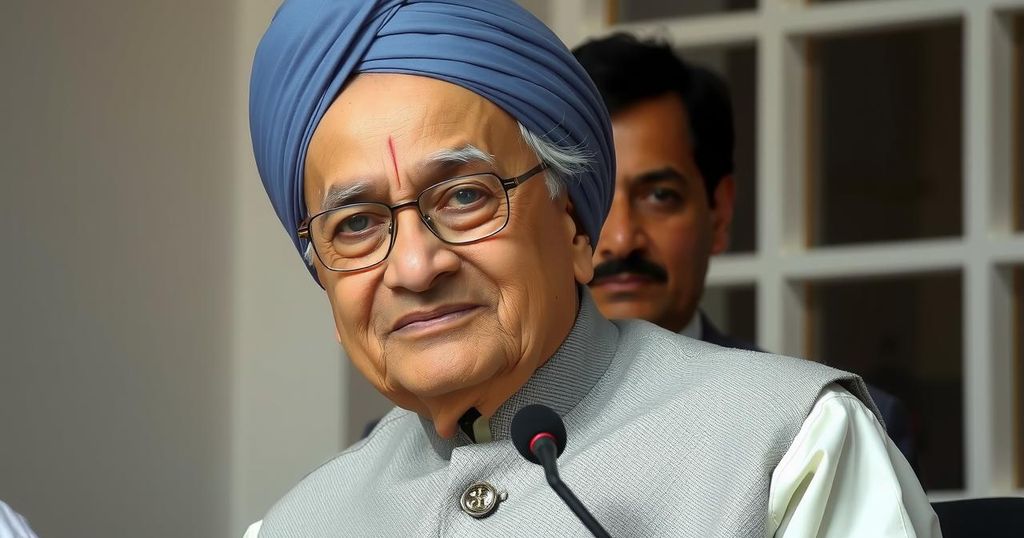Politics
AFRICA, ALAN COWELL, ALL INDIA INSTITUTE OF MEDICAL SCIENCES, ASIA, CHINA, DEMOCRACY, EUROPE, GOVERNANCE, INDIA, LEADERSHIP, LONDON, MAN, MEXICO, MIDDLE EAST, NA, NEW DELHI, NEW YORK TIMES, NORTH AMERICA, PAKISTAN, PUNJAB, RELIGION, SINGH, THE TIMES, TIMES, UNITED KINGDOM
Leila Ramsay
0 Comments
Obituary of Manmohan Singh: Architect of India’s Economic Transformation
Manmohan Singh, the first Sikh Prime Minister of India, passed away at 92. He was instrumental in implementing economic reforms that transformed India into a competitive economic power. Known for his humility and reticence, he maintained a focus on growth despite challenges. His passing is a significant moment in Indian political history, acknowledged by leaders including Prime Minister Narendra Modi.
Manmohan Singh, the esteemed former Prime Minister of India, passed away at the age of 92 in New Delhi. A pivotal figure in Indian politics, Mr. Singh was the first Sikh to hold the position, and he played a crucial role in transforming India’s economy through significant free-market reforms. His tenure set into motion a period of unprecedented economic growth, establishing India as a formidable economic competitor against other nations, particularly China. Prime Minister Narendra Modi honored Mr. Singh’s legacy, referring to him as one of India’s “most distinguished leaders.”
Born in what is now Pakistan, Mr. Singh’s early life was profoundly impacted by the tumultuous events surrounding India’s partition in 1947. He was known for his modest demeanor and reluctance to engage with the media, limiting his public appearances. His rise to prominence occurred in 1991 when he served as finance minister and began implementing essential economic reforms that sparked rapid development in India’s economy, although disparities in wealth distribution remained an ongoing issue.
Throughout his lengthy career, Mr. Singh was a witness to and participant in India’s complex socio-political landscape. His relative reticence in the face of criticism, particularly during scandal allegations against his administration, did not obscure the lasting impact of his policies that have helped shape contemporary India. His visionary leadership left an indelible mark, making him a historic figure in India’s narrative.
Until his passing, Mr. Singh’s contributions to public service and economic strategy were recognized as foundational to the successes India has achieved today. His achievements in governance will continue to influence future generations and serve as a reference point for leaders in the years to come.
Manmohan Singh served as India’s Prime Minister from 2004 to 2014, after previously holding the position of Finance Minister and Governor of the Reserve Bank of India. His leadership is credited with ushering in significant economic reforms in 1991 that liberalized India’s economy, leading to robust growth and modernization. His policies not only increased India’s global economic stature but also set a precedent for future economic policy in the country. His unique background as a Sikh leader and his experiences shaped his governance approach, emphasizing economic development while seeking diplomatic relations with neighboring nations, particularly Pakistan. His passing marks the end of an era for Indian politics, reflecting on the combined challenges and triumphs of his long career.
The passing of Manmohan Singh marks a significant loss for India, as he was a leading architect of the country’s economic transformation and a key political figure. His innovative policies and diplomatic efforts had lasting effects on India’s economic landscape, paving the way for future developments. As the first Sikh Prime Minister, his leadership style and achievements remain a pivotal chapter in India’s history, inspiring current and future leaders. His legacy will be remembered not only for economic reforms but also for his dedication to fostering peace and stability in the region.
Original Source: www.nytimes.com




Post Comment